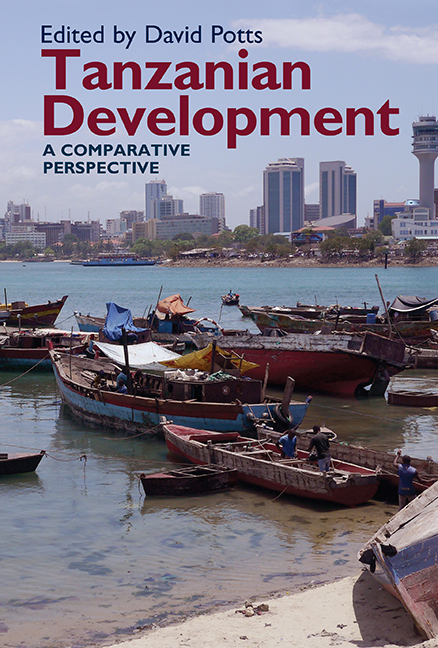Book contents
- Frontmatter
- Contents
- List of Illustrations
- Contributors
- Acknowledgements
- 1 Introduction – Tanzanian Development: A Comparative Perspective
- 2 The Political Economy of Tanzania 1967–2017: Reimagining the State
- 3 Reflections on the Tanzanian Trajectory: Decline and Recovery
- 4 Agricultural Development in Tanzania
- 5 Assets and Poverty Dynamics: The Methodological Challenges of Constructing Longitudinal Surveys in Tanzania
- 6 Contract Farming in Tanzania: Experiences from Tobacco and Sunflower
- 7 ‘We Just Sell Water – That is All We Do’: Two Cases of Small-scale Irrigation in Tanzania
- 8 The Industrial Development of Tanzania in Comparative African Perspective
- 9 Competitiveness in African Manufacturing: Some Evidence from Tanzania
- 10 ‘Good Life Never Comes Like Dreams’: Youth, Poverty and Employment in Arusha
- 11 International Aid to Tanzania – with some comparisons from Ghana and Uganda
- 12 Real Exchange Rate Changes and Export Performance in Tanzania and Ethiopia
- 13 Economic Leakage as a Constraint on Tourism's Effective Contribution to Local Economic Development in Tanzania
- 14 Extractive Industry Revenues and their Expenditure in Local Government Authorities: The Case of the Gold Service Levy in Geita District Council in Tanzania
- 15 Conclusion
- References
- Index
7 - ‘We Just Sell Water – That is All We Do’: Two Cases of Small-scale Irrigation in Tanzania
Published online by Cambridge University Press: 24 October 2019
- Frontmatter
- Contents
- List of Illustrations
- Contributors
- Acknowledgements
- 1 Introduction – Tanzanian Development: A Comparative Perspective
- 2 The Political Economy of Tanzania 1967–2017: Reimagining the State
- 3 Reflections on the Tanzanian Trajectory: Decline and Recovery
- 4 Agricultural Development in Tanzania
- 5 Assets and Poverty Dynamics: The Methodological Challenges of Constructing Longitudinal Surveys in Tanzania
- 6 Contract Farming in Tanzania: Experiences from Tobacco and Sunflower
- 7 ‘We Just Sell Water – That is All We Do’: Two Cases of Small-scale Irrigation in Tanzania
- 8 The Industrial Development of Tanzania in Comparative African Perspective
- 9 Competitiveness in African Manufacturing: Some Evidence from Tanzania
- 10 ‘Good Life Never Comes Like Dreams’: Youth, Poverty and Employment in Arusha
- 11 International Aid to Tanzania – with some comparisons from Ghana and Uganda
- 12 Real Exchange Rate Changes and Export Performance in Tanzania and Ethiopia
- 13 Economic Leakage as a Constraint on Tourism's Effective Contribution to Local Economic Development in Tanzania
- 14 Extractive Industry Revenues and their Expenditure in Local Government Authorities: The Case of the Gold Service Levy in Geita District Council in Tanzania
- 15 Conclusion
- References
- Index
Summary
Introduction
The quest for agricultural transformation has been a concern in both colonial Tanganyika and post-colonial Tanzania. In a country with a population that relies on agricultural livelihoods the reduction of poverty must necessarily hinge on such transformation. Irrigation is seen as a vital component of improving agricultural productivity, and has been given renewed attention under recent agricultural initiatives. While small-scale indigenous irrigation has a long history, large donor-funded irrigation schemes have not been very successful. and transformation of agriculture through irrigation remains a potential rather than a reality.
To explore the issue further, this chapter examines the dynamics of irrigation by small-scale farmers in two sites in Tanzania: one is an informal irrigation farmer-led scheme on the Uluguru Mountains; and the other a formalized and donor-supported rehabilitation of a former state rice farm under the cooperative ownership of small-scale farmers. These two cases reveal some critical shortcomings in current institutional arrangements for managing allocations of water in Tanzania, and suggest that, without addressing these, the latent potential of irrigation to transform Tanzanian agriculture will remain latent.
Irrigation and Agricultural Policy in Tanzania
Despite the emergence and development of industries, mining, tourism and services, agriculture continues to be significant for Tanzanian development owing to the number of poor people it employs and the strong consumption linkages it has with other sectors (Aman 2005; Coulson 2012; Jenkins 2012). The exact proportion contributed by agriculture to Tanzanian GDP is not universally agreed but ranges from estimates of 25 per cent (UNDP 2012) to around 45 per cent of total GDP (AgWater 2010), and 30 per cent of export earnings (AgWater 2010) to 85 per cent of export earnings (UNDP 2012a). Agriculture continues to provide a significant proportion of the livelihoods of 80 per cent of the population (AgWater 2010; UNDP 2012a; Coulson 2012, 2013). Therefore, support for agricultural development is important for both the nation's overall economic prosperity and for poverty reduction efforts (URT 2005).
Poor transport infrastructure, a lack of appropriate institutional frameworks, unfavourable market conditions, poor technology adoption, restrictive taxation and tariff regimes, and continued reliance on rain-fed agriculture constrain productivity in the agricultural sector (Aman 2005; AgWater 2010; Jenkins 2012).
- Type
- Chapter
- Information
- Tanzanian DevelopmentA Comparative Perspective, pp. 140 - 162Publisher: Boydell & BrewerPrint publication year: 2019

